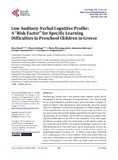| dc.description.abstract | Preschool-age children with a low auditory-verbal cognitive profile may be
predisposed to develop subsequent learning difficulties. This study, through
the use of early diagnostic procedures and a special intervention program, attempts
to “balance” these discrepancies. More specifically, aim of the present
study is to implement an intervention programme in children being “at risk”
for learning difficulties. For the purpose of the present study, the DTLA-2 test
was used to assess 420 preschool children aged between 6.0 and 6.4 years. During
pretesting, the 420 children were divided into 4 groups according to their
cognitive profiles based on the DTLA-2 test assessment. Of the total sample,
40 children according to their low performances in all cognitive verbal and
non-verbal sub-tests of DTLA-2 were selected for the final construction of the
experimental group (11 boys and 9 girls) and its control group (10 boys and
10 girls). The intervention procedure lasted 3 months and the children attended
approximately 20 sessions (20 - 25 minutes each), either individually
or in a small group of two or three children. In the three-month follow-up
(post-test), a better balance in their cognitive profile was achieved compared
to the control group. In a one year follow-up, similar results were detected. More specifically, the differences between the verbal and non-verbal scales of
the DTLA-2 test remained significant in the control group, whereas, in the
experimental group, no significant differences were detected between the two
scales, thus revealing the positive results of intervention, as regards preschool
children’s “at risk” specific cognitive profile. These results underline the importance
of early diagnosis and appropriate intervention in children with specific
cognitive profiles, who are “at risk” for developing subsequent learning
difficulties. | en_UK |


